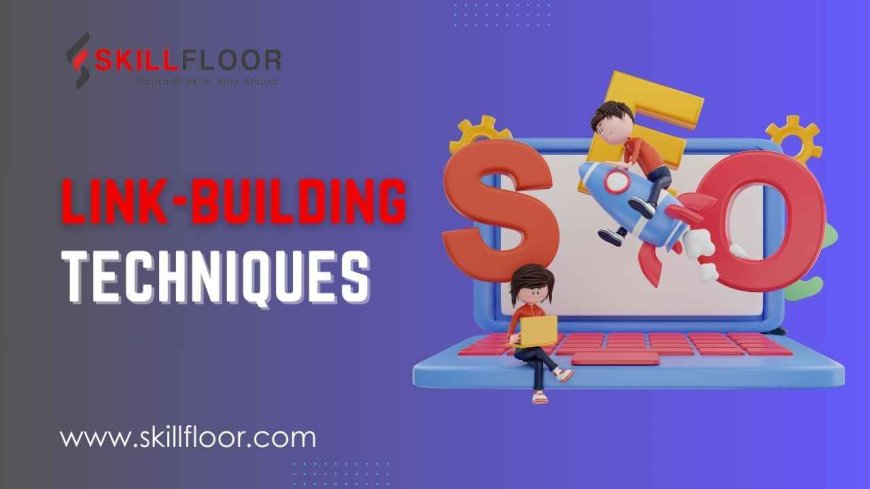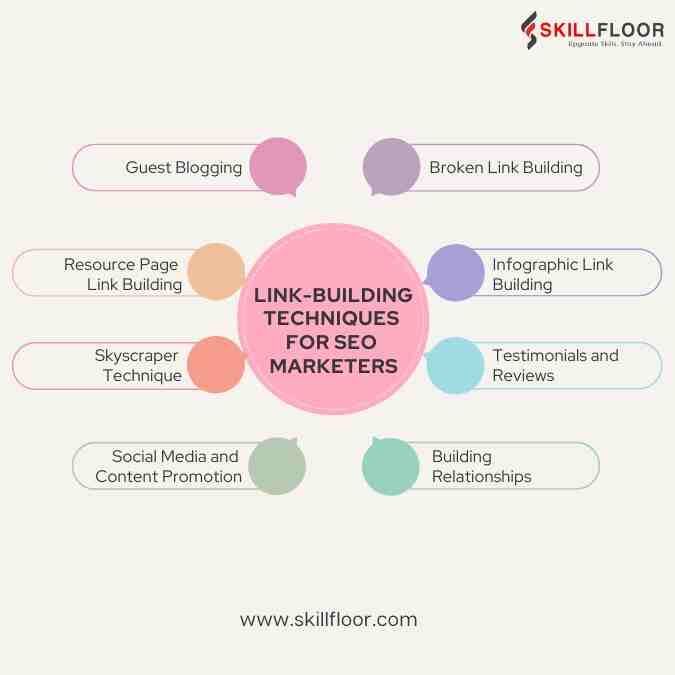Effective Link-Building Techniques for SEO Marketers
Discover effective link-building techniques for SEO marketers to boost your website's visibility and ranking. Learn strategies to enhance your online presence.

SEO marketers play a vital role in boosting a website's online presence. One effective approach is link-building, which involves returning links from other websites to your own. Start by exploring guest blogging opportunities where you can write articles for different sites and include a link back to yours. Another useful method is broken link building. This involves finding broken website links and suggesting your content as a replacement. These strategies not only increase your site's visibility but also build relationships with others in your industry.
For SEO marketers, it’s also beneficial to diversify how you build links. Participate in online communities like forums or social media groups related to your field. Sharing your expertise in these spaces can naturally lead to link opportunities. Partnering with influencers or local businesses can also provide valuable backlinks. The key is to focus on gaining links from websites that are relevant to your niche, which aligns well with broader digital marketing goals. By employing these techniques, SEO marketers can steadily improve their website's authority and search engine performance.
1. Guest Blogging
Guest blogging entails publishing content for other websites in your niche. It's a natural method to showcase your skills while also including links to your website.
How to Get Started with Guest Blogging:
-
Find Relevant Blogs: Look for blogs in your industry that accept guest posts.
-
Pitch Interesting Ideas: Develop a pitch that provides relevant insights to their audience.
-
Write Quality Content: Make sure your content is informative, entertaining, and well-written.
-
Include Thoughtful Backlinks: Place links on your website where they give value and flow smoothly with the content.
2. Broken Link Building
Broken link building entails identifying non-functional links on other websites and recommending your own as a replacement. This method assists webmasters in repairing broken links while also providing you with a backlink.
Steps for Broken Link Building:
-
Identify Broken Links: Use tools like Ahrefs or SEMrush to find broken links on websites in your niche.
-
Create or Use Relevant Content: Ensure that your content is appropriate for the context of the broken link.
-
Reach Out to Webmasters: Inform the website owner about the broken link and recommend your content as a possible substitute.
3. Resource Page Link Building
Resource pages are collections of helpful links on specific topics, often curated by industry leaders. Getting your link on these pages can be very beneficial.
How to Approach Resource Page Link Building:
-
Search for Resource Pages: Use search queries like “keyword + resource page” or “keyword + helpful links” to find potential pages.
-
Assess Relevance: Ensure the resource page is up-to-date and relevant to your content.
-
Contact the Webmaster: Send a personalized message explaining why your content would be a useful addition.
4. Infographic Link Building
Infographics are engaging, easy-to-digest content items that can generate backlinks. Create high-quality infographics to persuade other sites to link to you when they share your pictures.
Using Infographic Link Building:
-
Create an infographic: Choose a theme that is both visually appealing and relevant to your audience.
-
Embed Your Link: Include a link to your website in the infographic.
-
Promote your infographic: Share it on social media, and contact related blogs and websites that may find it valuable.
5. Skyscraper Technique
The skyscraper strategy is identifying high-performing content in your niche and producing something even more detailed and valuable.
How to Apply the Skyscraper Technique:
-
Find Top Content: Use tools like BuzzSumo to find popular content in your niche.
-
Create Better Content: Improve existing content by providing more precise information, better pictures, or updated data.
-
Reach Out to Link Sources: Contact the websites that link to the original content and request that they link to your revised version.
6. Testimonials and Reviews
Offering testimonials or reviews for products and services you use can lead to backlinks. Companies often feature these on their websites along with a link back to your site.
Leveraging Testimonials and Reviews:
-
Choose Relevant Products/Services: Pick products or services that align with your niche.
-
Provide Genuine Feedback: Write detailed and honest testimonials or reviews.
-
Submit Your Testimonial: Contact the company and offer your feedback for them to showcase on their site.
7. Social Media and Content Promotion
Although social network links do not directly affect SEO, they can increase traffic and visibility, resulting in more backlinks from other websites.
Promoting Content Using Social Media:
-
Share Your Content Widely: Promote your content through social media outlets.
-
Engage with Influencers: Tag or mention influencers who may find your content useful and share it with their audiences.
-
Join Relevant Communities: Participate in forums, groups, or communities about your industry and distribute your content as appropriate.
8. Building Relationships
Networking with other bloggers, influencers, and industry experts can automatically result in backlink chances.
Tips for Building Relationships:
-
Engage on Social Media: Regularly, interact with influencers in your niche on social media.
-
Attend Industry Events: Join webinars, conferences, and other events to meet potential link partners.
-
Offer Value First: Provide value to others without instantly requesting a backlink. This could include sharing their information, offering insights, or working together on initiatives.

Why is link-building important for SEO?
Link building is an important component of SEO since search engines evaluate backlinks to determine a website's authority, trustworthiness, and relevance. When credible sites link to your content, search engines such as Google recognize your site as a significant resource deserving of higher ranking in search results. High-quality backlinks from authoritative websites boost your domain authority, increasing the likelihood that your site will rank well for relevant keywords. Furthermore, backlinks drive referral traffic to your website, attracting users who are truly interested in your content. This surge of focused traffic can result in more engagement, longer dwell times, and possibly more conversions. Furthermore, a strong backlink profile might help you stand out in competitive categories by demonstrating your content's authenticity and relevancy. In essence, effective link-building not only boosts your search engine rankings but also enhances your overall online visibility and credibility.
Link-building is a constant process that mixes strategy with actual relationships. By using these practical tactics, SEO marketers may build a strong backlink profile that boosts their site's authority and search engine rankings. Focus on building important, high-quality relationships, keeping up with industry developments, and refining your strategy as you go. This will not only increase your SEO but also create a network of essential relationships that will help you maintain your digital presence over time. Implementing these tactics can help you increase the exposure of your website and lay a solid basis for long-term SEO success.






























































